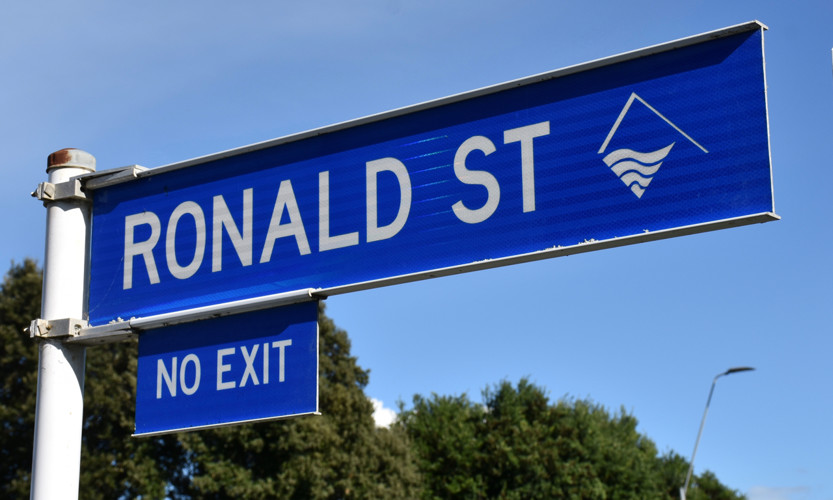 Ronald Street sign (2020). Mike Gooch. Word on the Street image collection.
Ronald Street sign (2020). Mike Gooch. Word on the Street image collection.
 Ronald Street sign (2020). Mike Gooch. Word on the Street image collection.
Ronald Street sign (2020). Mike Gooch. Word on the Street image collection.
"An Extraordinary Case" read the headline in the Taranaki Daily News on 27 September 1906. The previous day, a claim against Alexander James McIntosh, former manager of the New Plymouth branch of the Bank of Australasia, had commenced in the New Plymouth Supreme Court.
No doubt the people of the town were intrigued with the tale of shady property deals and alleged "hocus pocus transactions". The plaintiff, James Harding, had arrived in New Plymouth at the age of 21 and promptly fell under the influence of the trusted bank manager. The unusual case, complicated by Harding's marriage to McIntosh's sister, lasted three days until an out of court settlement was reached, much to the approval of the presiding judge.
The publicity must have been quite unwelcome for McIntosh, who had left New Plymouth in 1904 to become the manager of the Invercargill branch of the Bank of Australasia. His promotion was celebrated with a gathering of customers, staff and dignitaries. Along with speeches and toasts, the respected bank manager was presented with a solid silver tea and coffee set.
Before leaving, the entrepreneurial Mr McIntosh subdivided a block of land in Strandon. At his suggestion the road was given the name Ronald, after his son. Ronald William Findlater was born in New Plymouth in 1897, as far as we are aware, the only child of Alexander and Mary Anne McIntosh.
Ronald McIntosh remained in the South Island and owned a guest house in Christchurch for many years. He died on 21 March 1962 and was buried at Linwood cemetery.
This story was originally published in the Taranaki Daily News.
Related items:
Taranaki DP1928 Sheet 1 (1902), ICS Pre 300,000 Cadastral Plan Index (Imaged by LINZ)
Taranaki SO2837 Sheet 2 (1906), ICS Pre 300,000 Cadastral Plan Index (Imaged by LINZ)
Extraordinary Property Deal (Taranaki Daily News 28 September 1906)
Interesting Land Case: Unexpectedly Fizzles Out (Taranaki Daily News 29 September 1906)
Please do not reproduce these images without permission from Puke Ariki.
Contact us for more information or you can order images online here.